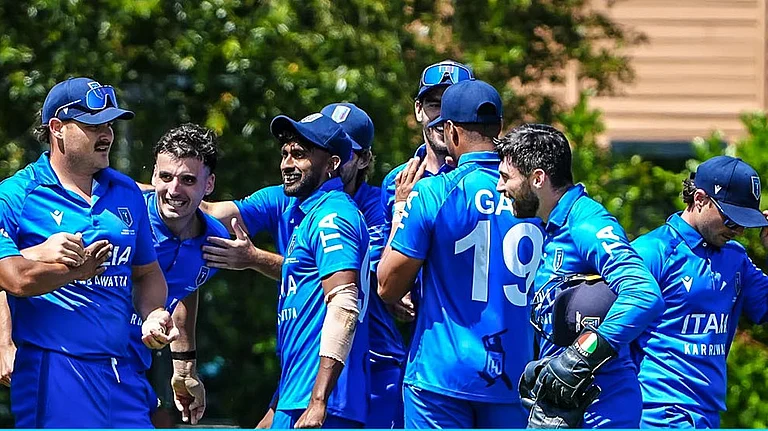PAKISTAN Prime Minister Nawaz Sharif took time over choosing his Cabinet. In India, the maximum curiosity was naturally about Pakistan's next foreign minister. Sharif made a rather unexpected and unusual choice: Capt. (retd) Gohar Ayub Khan, son of the former Pakistani president, Field Marshal Mohammed Ayub Khan. The point to note: Gohar Ayub Khan has the Army high command's blessings—and is a hawk on India.
For a while, there was speculation that Sharif would keep the key foreign affairs portfolio. Given the turmoil in Afghanistan, the uneasy relations with Iran and India, and tensions in Pak-US relations, it was expected that he would choose someone who wasn't prejudiced. Sharif also had to pay heed to other demands: the foreign, defence and finance ministers had to be acceptable to President Farooq Leghari and, more importantly, to Pakistan's Army—and also the US.
Besides former minister of state for foreign affairs Siddique Kanju, the other names doing the rounds were that of former finance minister Sartaj Aziz and Sahabzada Yakub Khan, former foreign minister who has a credible face in the US.
Thus, in many ways, Sharif's choice sets aside the presumptive logic for the choice of foreign minister. Reports from Islamabad indicate that Gohar Ayub was perhaps not his first choice. He was apparently more inclined towards a senior Pakistan Muslim League leader. His appointment, one gathers, was the result of two meetings Sharif had with Chief of Army Staff Jehangir Karamat to formalise the Cabinet.
Karamat reportedly told Sharif not to be too enthusiastic about making any fundamental changes in Pakistan's foreign policy, particularly regarding India. He wanted someone who would conform to the existing terms of reference of Pakistan's foreign and def-ence policies. Karamat first veered around the articulate Yakub Khan, foreign minister under Zia-ul-Haq and also during Benazir Bhutto's first tenure—the Army had forced her to retain him. But Sharif, in his first tenure, had replaced him with Kanju. This time too, Sharif has dumped Yakub Khan.
Then Karamat thought of Gohar Ayub Khan, who had retired from the Army during the early years of his father's rule in Pakistan and set up business. He went on to become one of the richest men in Pakistan under his father's patronage; his name figured among the 22 families accused of taking advantage of Ayub Khan's long stint in power. Zulfiqar Ali Bhutto and the People's Party accused him of being one of the main reasons for Field Marshal Ayub Khan's downfall.
Gohar Ayub is a political survivor. He emerged on the Pakistani political sceneduring Gen. Zia's times, ultimately rising to the rank of Speaker of the National Assembly when Sharif became prime minister for the first time in October 1990.
His track record as a politician is not too heartening: his anti-India stance is strident, not just on Kashmir but on other extraneous issues as well. He has often cast doubts on India's bonafides as a secular society and questioned the credibility of Indian democracy, alleging that India per-secutes its Muslim minority. In informal chats, he has also promised that India will have to pay the price for helping East Pakistan (Bangladesh) gain independence.
I have had a glimpse of his Indo-phobia. Though I met him on several occasions when I was India's High Commissioner in Pakistan between 1989 and 1991, I spoke to him only once, when I called on him when he was Speaker. In a discussion on the Partition, Gohar Ayub told me, in all seriousness, that there were two reasons why it was inevitable. First, that Muslims and Hindus could never live together because of their differing religions and that it was better for Muslims to carve out a separate homeland in the subcontinent. Second, that Muslims, who had ruled the subcontinent for 1,000 years, could not reconcile themselves to living in a state where Hindus would dominate the political processes.
When I told him that I had a different perception of both the political and socio-cultural history of India, he said that it was precisely that idea which made Muslims more anxious to create Pakistan.
But he added that post Partition, "it would be sensible to have a working relationship with each other". He was even more tactless when he came to New Delhi to participate in a meeting of the Inter-Parliamentary Union in April 1993. Apart from his aggressive Kashmir stance, he went public about India's economic backwardness, social inequities and political ineptitudes. He also indulged in wishful thinking that under these circumstances India might not remain united. Privately, he added that a fragmented India would perhaps give a greater sense of security to its small neighbours and contribute to regional stability. The External Affairs Ministry made appropriate noises, questioning the propriety of Gohar Ayub's statements, since he was India's guest. Gohar Ayub was unfazed.
It would indeed be a pleasant surprise if his mindset has undergone a change.
Is his appointment as foreign minister a signal to India that while Pakistan is willing to restart talks, it will stick to its Kashmir policy? Given his past record, he is most likely to contradict Sharif's views on how to go about mending bilateral relations. The thought brings little cheer.


























